邹为诚《综合英语教程》(第三版)第2册听力文本
综合英语教程4第三版课后翻译答案
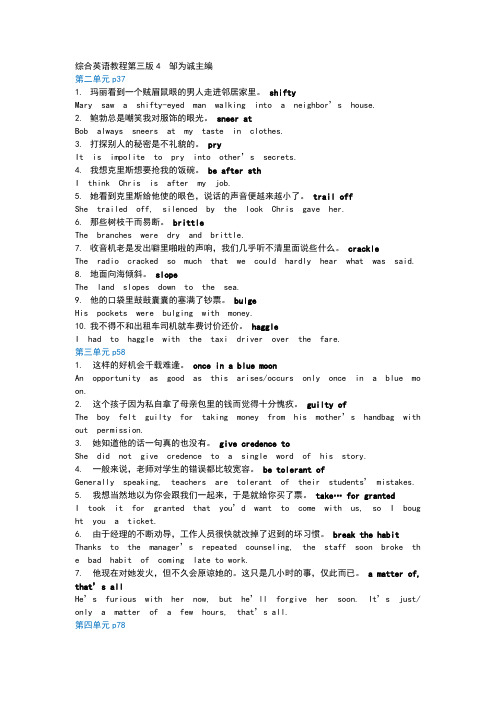
综合英语教程第三版4 邹为诚主编第二单元p371.玛丽看到一个贼眉鼠眼的男人走进邻居家里。
shiftyMary saw a shifty-eyed man walking into a neighbor’s house.2.鲍勃总是嘲笑我对服饰的眼光。
sneer atBob always sneers at my taste in clothes.3.打探别人的秘密是不礼貌的。
pryIt is impolite to pry into other’s secrets.4.我想克里斯想要抢我的饭碗。
be after sthI think Chris is after my job.5.她看到克里斯给他使的眼色,说话的声音便越来越小了。
trail offShe trailed off, silenced by the look Chris gave her.6.那些树枝干而易断。
brittleThe branches were dry and brittle.7.收音机老是发出噼里啪啦的声响,我们几乎听不清里面说些什么。
crackleThe radio cracked so much that we could hardly hear what was said. 8.地面向海倾斜。
slopeThe land slopes down to the sea.9.他的口袋里鼓鼓囊囊的塞满了钞票。
bulgeHis pockets were bulging with money.10.我不得不和出租车司机就车费讨价还价。
haggleI had to haggle with the taxi driver over the fare.第三单元p581. 这样的好机会千载难逢。
once in a blue moonAn opportunity as good as this arises/occurs only once in a blue mo on.2. 这个孩子因为私自拿了母亲包里的钱而觉得十分愧疚。
综合英语教程2(第三版)课后翻译整合版
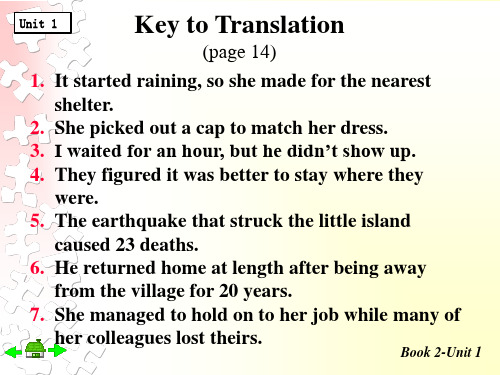
Book 2-Unit 15
Book 2-Unit 2
1.
2.
3. 4. 5.
6. 7.
Unit 5
Key to Translation
(page 75-76)
Unit 7
Key to Translation
(page 103)
1. Her bedroom has large windows overlooking a beautiful lake. 2. He collapsed into the armchair, stretching out his legs in front of him. 3. I simply could not live there; it rained day in and day out when I went there on holiday. 4. A dry warehouse is important especially in the case of these medicines. 5. The people in this village, for the most part, are quiet and well behaved. 6. We tend to get cold winters and warm, dry summers in this part of the country. 7. It’s a simple dish to prepare, consisting mainly of beef and vegetable.
Book 2-Unit 1
Unit 2
Key to Translation
(page 30)
My teacher told me that the liquid in the bottle could remove stains from metal and china. The student sitting beside me looked around the examination room with apprehension. He is now out of college and lives on his own. They took turns staying awake in case anything went wrong. The elder daughter will probably follow in her father's footsteps and take over the family business when she's old enough. He had to get off his bike and push it up the hill. This pair of gloves will protect your hands against the cold.
英语听力教程第二册第三版unit1听力原文
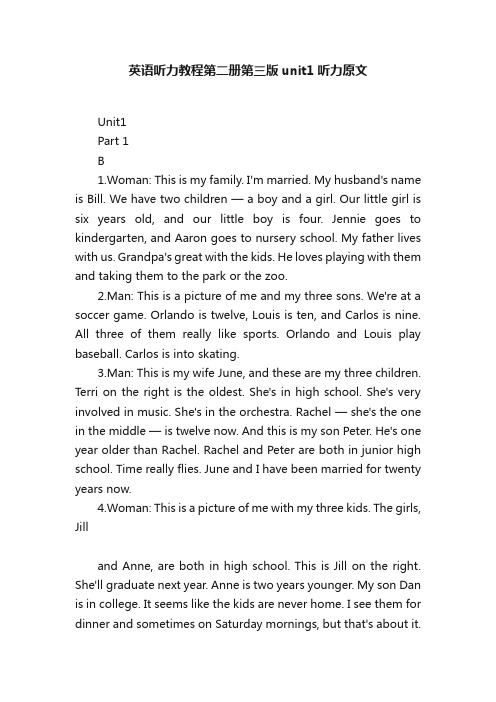
英语听力教程第二册第三版unit1听力原文Unit1Part 1B1.Woman: This is my family. I'm married. My husband's name is Bill. We have two children — a boy and a girl. Our little girl is six years old, and our little boy is four. Jennie goes to kindergarten, and Aaron goes to nursery school. My father lives with us. Grandpa's great with the kids. He loves playing with them and taking them to the park or the zoo.2.Man: This is a picture of me and my three sons. We're at a soccer game. Orlando is twelve, Louis is ten, and Carlos is nine. All three of them really like sports. Orlando and Louis play baseball. Carlos is into skating.3.Man: This is my wife June, and these are my three children. Terri on the right is the oldest. She's in high school. She's very involved in music. She's in the orchestra. Rachel — she's the one in the middle — is twelve now. And this is my son Peter. He's one year older than Rachel. Rachel and Peter are both in junior high school. Time really flies. June and I have been married for twenty years now.4.Woman: This is a picture of me with my three kids. The girls, Jilland Anne, are both in high school. This is Jill on the right. She'll graduate next year. Anne is two years younger. My son Dan is in college. It seems like the kids are never home. I see them for dinner and sometimes on Saturday mornings, but that's about it.They're really busy and have a lot of friends.CWoman: Well, my brother was six years younger than I, and er, I think that when he was little I was quite jealous of him. I remember he had beautiful red curls (mm) ... my mother used to coo over him. One day a friend and I played, erm, barber shop, and, erm, my mother must have been away, she must have been in the kitchen or something (mm) and we got these scissors and sat my brother down and kept him quiet and (strapped him down) ... That's right, and cut off all his curls, you see. And my mother just was so ups et, and in fact it's the first ... I think it’s one of the few times I've ever seen my father really angry.Man: What happened to you?Woman: Oh ... I was sent to my room for a whole week you know, it was terrible.Man But was that the sort of pattern, weren't you close to yourbrother at all?Woman: Well as I grew older I think that er I just ignored him ...Man: What about ... you've got an older brother too, did ... were they close, the two brothers?Woman: No, no my brother's just a couple of years older than I ... so the two of us were closer and we thought we were both very grown up and he was just a ... a kid ... so we deliberately, I think, kind of ignored him. And then I left, I left home when he was only still a schoolboy, he was only fifteen (mm) and I went to live in England and he eventually went to live in Brazil and I really did lose contact with him for a long time.Man: What was he doing down there?Woman: Well, he was a travel agent, so he went down there to work ... And, erm, I didn't, I can't even remember, erm sending a card, even, when he got married. But I re ... I do remember that later on my mother was showing me pictures of his wedding, 'cause my mother and father went down there (uh huh) to the wedding, and er, there was this guy on the photos with a beard and glasses, and I said,"Oh, who's this then?" 'cause I thought it was the bride's brother or something like this (mm) ... and my mother said frostily, "That ... is your brother!" (laughter) Questions for memory test:1. According to the passage, how many brothers does the lady have?2. When the sister saw her mother coo over her younger brother, how did she feel?3. What's her father's reaction when he got to know that the sister had cut off her younger brother's hair?4. How old was her younger brother when she left home?5. Where did her brother eventually live?6. Who was the guy on the photos with a beard and glasses?PART 2A and BRadio presenter: Good afternoon. And welcome to our midweek Phone-In. In today's program we' re going to concentrate on personal problems. And here with me in the studio I've got T essa Colbeck, who writes the...in Flash magazine, and Doctor Maurice Rex, Student Medical Adviser at the University of Norfolk.The number to ring with your problem is oh one, if you are outside London, two two two, two one two two. And we have our first caller on the line, and it’s Rosemary, I think, er calling fromManchester. Hello,Rosemary.Rosemary: Hello.Radio presenter: How can we help you, Rosemary?Rosemary: Well it’s my dad. He won’t let me stay out after ten o'clock at night and all my friends can stay out much longer than that. I always have to go home first. It's really embarrassing...Tessa: Hello, Rosemary, love. Rosemary, how old are you, dear?Rosemary: I'm fifteen in two month's time.Tessa: And where do you go at night?--When you go out?Rosemary: Just to my friend's house, usually. But everyone else can stay there much later than me. I have to leave at about a quarter to ten.Tessa: And does this friend of yours-does she live near you?Rosemary: It takes about ten minutes to walk from her house to ours.Tessa: I see. You live in Brighton, wasn’t it? Well ,Brighton’s…Rosemary: No, Manchester…I live in Manchester.Tessa: oh. I’m sorry, love. I’m getting mi xed up. Yes, well Manchester's quite a rough city, isn't it ? I mean, your dad...Rosemary: No, not really. Not where we live, it isn’t. I don't live in the City Center or anything like that. And Christine's house is in a veryquiet part.Tessa: Christine. That's your friend, is it?Rosemary: Yeah. That's right. I mean, I know my dad gets worried but it’s perfectly safe.Maurice: Rosemary. Have you talked about this with your dad?Rosemary: No. He just shouts and then he says he won't let me go out at all if I can't come home on time.Maurice: Why don't you just try to sit down quietly with your dad-- sometime when he's relaxed--and just have a quiet chat about it? He’ll probably explain why he worries about you. It isn't always safe for young girls to go out at night.Tessa: Yes. And maybe you could persuade him to come and pick you up from Christine's house once or twice.Rosemary: Yes .I don't think he'll agree to that, but I'll talk to him about it . Thanks.Part 3Josephine: We did feel far more stability in our lives, because you see ... in these days I think there's always a concern that families will separate or something, but in those days nobody expected the families to separate.Gertrude: Of course there may have been smoking, drinking and drug-taking years ago, but it was all kept very quiet, nobody knew anything about it. But these days there really isn't the family life that we used to have. The children seem to do more as they like whether they know it's right or wrong. Oh, things are very different I think.Question: What was your parents' role in family life?Josephine:Well, my mother actually didn't do a tremendous amount in the house, but she did do a great deal of work outside and she was very interested, for example, in the Nursing Association collecting money for it. We had somebody who looked after us and then we also had someone who did the cleaning.Gertrude: Well, we lived in a flat, we only had three rooms and a bathroom. Father worked on the railway at Victoria Stationand my mother didn't work, obviously. My father's wage I think was about two pounds a week and I suppose our rent was about twelve shillings a week, you know as rent was - I'm going back a good many years. We didn't have an easy life, you know and I think that's why my mother went out so much with her friends. It was a relief for her, you know really.Question: Did you have a close relationship with your parents?Josephine: In a sense I would say not very close but we, at thattime, didn't feel that way, we didn't think about it very much I don't think.I think today people are much closer to their parents and talk about everything, which we didn't. Then, of course, we used to play a lot of games, because we didn't have a television or even a radio and we would play games in the evenings rather than have conversation, I think.Question: Was there more discipline in families in those days?Josephine:Oh yes, I do think so, yes. We were much more disciplined and we went about as a family and it wasn't until I was probably about 18 before I would actually go out with any friends of my own.Statements:1. Seventy years ago young people often smoked and drank in front of others.2. Apart from a great deal of work outside, Josephine's mother also looked after her children and did the cleaning in the house.3. Gertrude's father earned two pounds a week.4. Gertrude's family had to pay ten shillings a week for their flat.5. Young people seventy years ago deeply felt that they did not havea very close relationship with their parents.6. Nowadays people are much closer to their parents and talk about everything to them.Part 4Q:Parent Link is an organization that looks at the problems that parents and children face. Its director, Tim Kahn, told us about the changing roles of parents and children.T: The authoritarian model was one in which the child had no rights and I guess in the 60s and perhaps the 70s many people rejected that and we had the sort of the permissive era---the age where many parents felt they had to allow their children to do whatever they wanted to do and so in a sense the roles were reversed and it was the children who were the bosses and the parents who ran around behind them. The ideas that we offer to parents are kind of a third position in which we’re looking at equals, where parents and children are different but equal.Q: What about changes in the male-female roles?T: Society has changed a lot. As well as technology leading to great changes, people’s roles have changed very much, in particular the women’s move ment has very much questioned the role of women and led many women to demand a freer choice about who they are and how they can be. There’s a lot of frustration with how men haven’t changed, and it seems to me that the more the frustration is expressed the more stuck in and being the same men are and we need to find ways of appreciating men for the amount of work that they have to do in being bread-winners and providers for families and appreciating the efforts men are making to be more involvedwith their children.Q:Are there any changes you would like to see in the attitude to family life in Britain?T: In the past there were arranged marriages and I wonder if part of having an arranged marriage is knowing that you have to work at it to create the love and that now people are getting married out of love and there’s a kind of feeling that your love is there and it will stay there for ever and we don’t have to work at it and when it gets tricky we don’t know how to work at it and so we opt out. I think helping people learn to work at their relationships to make their relationship work would be a significant thing that I’d like to see happening.Part 5BLouisa: She doesn't let me watch that much TV after school, which is really annoying because most of my friends watch Home and Away and Neighbors but I only get to watch one of them. I sometimes don't — Imean I think that's really unfair so sometimes I just watch both anyway.Mother:First and foremost, Louisa watches a fair amount of television whether she thinks she's deprived or not, she must watch at least 45 minutes per day. And when I'm not around you know I know the child sneaks in a fair amount more than that. So she gets in a fair amount of television, certainly on the weekends. But I am of the opinion that television, very very very few programs will teach them anything. And I think when a child is under your care for 18 years it's the parents' responsibility to make sure that the input is of value, and I don't think television, much television is of any value at all, I think reading a book anddoing her piano lessons are far more valuable than watching crummy American soap operas.Questions for memory test:1. How many TV plays are mentioned?2. For how long a time does Louisa watch TV per day?3. Does Louisa try to get more time to watch TV?4. Which activities does Louisa's mother think are far more valuable?CMy parents gave me a lot of free time. After dinner, during the week when I was say even 15 years old they would let me go out until ten o'clock and they would never ask where I went. I would smoke cigarettes and drink beer, at 15 years old I would hang out in the ... in the local pubs and these were type of things that I don't think were too good for me at that time. I think my parents should have, you know, maybe at least showed an interest as to where I was going. They never even asked where I was going and they, they gave me a lot of free time, and I think that they, they felt that this was a thing that was being a good parent. But I think that teenagers are very naive, and I was as a teenager very naive, and I think I could have used a little more direction from them. These days a lot of parents think they should be lenient with their children, they should let them grow and experience on their own. And I think that's what my parents were doing, I think there's a Biblical saying "Spare the rod, spoil the child" and I think that really applies. And I think you need to direct especially young people. They can be thrown into such a harsh world, especially if you live in a city. I lived in a very small village and it was still a rough crowd that I found in that village. And my parents never asked questions, and if they only knewthey would be shocked.。
综合英语教程(第三版 邹为诚主编)课后翻译(部分)
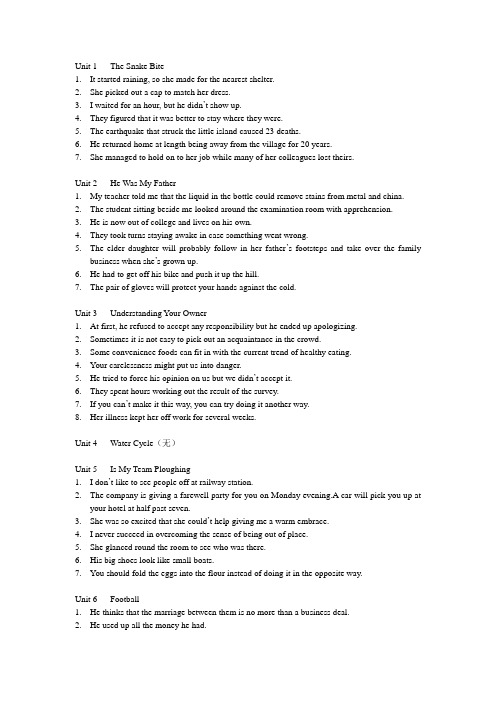
Unit 1 The Snake Bite1.It started raining, so she made for the nearest shelter.2.She picked out a cap to match her dress.3.I waited for an hour, but he didn’t show up.4.They figured that it was better to stay where they were.5.The earthquake that struck the little island caused 23 deaths.6.He returned home at length being away from the village for 20 years.7.She managed to hold on to her job while many of her colleagues lost theirs.Unit 2 He Was My Father1.My teacher told me that the liquid in the bottle could remove stains from metal and china.2.The student sitting beside me looked around the examination room with apprehension.3.He is now out of college and lives on his own.4.They took turns staying awake in case something went wrong.5.The elder daughter will probably follow in her father’s footsteps and take over the familybusiness when she’s grown up.6.He had to get off his bike and push it up the hill.7.The pair of gloves will protect your hands against the cold.Unit 3 Understanding Your Owner1.At first, he refused to accept any responsibility but he ended up apologizing.2.Sometimes it is not easy to pick out an acquaintance in the crowd.3.Some convenience foods can fit in with the current trend of healthy eating.4.Your carelessness might put us into danger.5.He tried to force his opinion on us but we didn’t accept it.6.They spent hours working out the result of the survey.7.If you can’t make it this way, you can try doing it another way.8.Her illness kept her off work for several weeks.Unit 4 Water Cycle(无)Unit 5 Is My Team Ploughing1.I don’t like to see people off at railway station.2.The company is giving a farewell party for you on Monday evening.A car will pick you up atyour hotel at half past seven.3.She was so excited that she could’t help giving me a warm embrace.4.I never succeed in overcoming the sense of being out of place.5.She glanced round the room to see who was there.6.His big shoes look like small boats.7.You should fold the eggs into the flour instead of doing it in the opposite way.Unit 6 Football1.He thinks that the marriage between them is no more than a business deal.2.He used up all the money he had.3.The young man saved your daughter from drowning.4.She had absolutely nowhere to go, so she read some old books at home.5.“Will I ever be as good a player as Geoff?” “Perhaps, but you still have a long way to gobefore that day comes.”6.He is in danger of losing his job.7.The practice of employing chidren to work in factories has nearly died out in many countries.Unit 7 The English Countryside1.Her bedroom has large windows overlooking a beautiful lake.2.He collapsed into the armchair, stretching out his legs in front of him.3.I simply couldn’t live there, it rained day in and day out when I went there on holiday.4. A dry warehouse is important especially in the case of these medicines.5.For the most part of the people in this village are quiet and well behaved.6.We tend to get cold winters and warm, dry summers in this part of the country.7.It’s a simple dish to prepare, consisting mainly of beef and vegetable.Unit 8 Beauty And Career1.I find it difficult to keep up with the changes in fashion.2.He doesn’t go in for outdoor sports much.3.My English is poor so I’m not up to translating the poem.4.People usually judge a person by his/her appearance.5.She looked as if she hadn’t slept all night.6.He was determined to go to great lengths to fulfill his ambition.7.He sat in the front so as to hear clearly.Unit 9 Secret Messages to Ourselves1.The new education system enables college students to gain work experience continuity theirstudies.2.The writer should draw on his imagination and experience in his writing.3.After a promising start, the company ran into heavy debt.4.“Have you drawn up the list of names yet.”“No, I’m still working on it.”5.Despite the great gap in age, they became good friends.6.He will not pass the examination unless he works harder.7.After turning it over in his mind for a whole week, he at last solved the problem.Unit 10 ~~~ Unit 15 (略)。
综合英语教程4《邹为诚》课文翻译
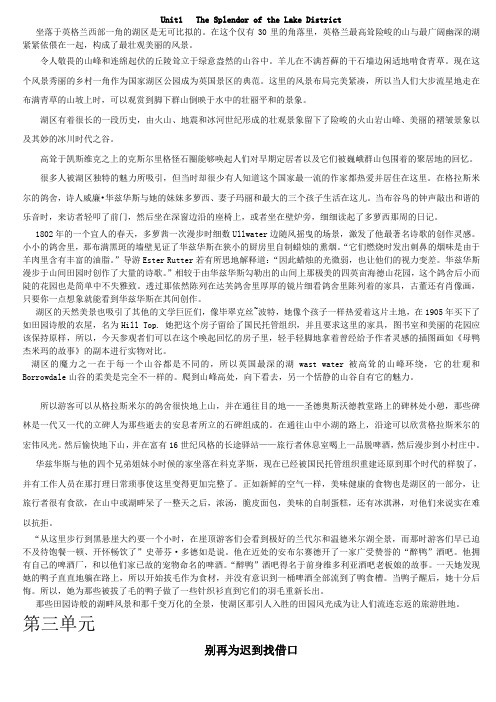
Unit1 The Splendor of the Lake District坐落于英格兰西部一角的湖区是无可比拟的。
在这个仅有30里的角落里,英格兰最高耸险峻的山与最广阔幽深的湖紧紧依偎在一起,构成了最壮观美丽的风景。
令人敬畏的山峰和连绵起伏的丘陵耸立于绿意盎然的山谷中。
羊儿在不满苔藓的干石墙边闲适地啃食青草。
现在这个风景秀丽的乡村一角作为国家湖区公园成为英国景区的典范。
这里的风景布局完美紧凑,所以当人们大步流星地走在布满青草的山坡上时,可以观赏到脚下群山倒映于水中的壮丽平和的景象。
湖区有着很长的一段历史,由火山、地震和冰河世纪形成的壮观景象留下了险峻的火山岩山峰、美丽的褶皱景象以及其妙的冰川时代之谷。
高耸于凯斯维克之上的克斯尔里格怪石圈能够唤起人们对早期定居者以及它们被巍峨群山包围着的聚居地的回忆。
很多人被湖区独特的魅力所吸引,但当时却很少有人知道这个国家最一流的作家都热爱并居住在这里。
在格拉斯米尔的鸽舍,诗人威廉•华兹华斯与她的妹妹多萝西、妻子玛丽和最大的三个孩子生活在这儿。
当布谷鸟的钟声敲出和谐的乐音时,来访者轻叩了前门,然后坐在深窗边沿的座椅上,或者坐在壁炉旁,细细读起了多萝西那周的日记。
1802年的一个宜人的春天,多萝茜一次漫步时细数Ullwater边随风摇曳的场景,激发了他最著名诗歌的创作灵感。
小小的鸽舍里,那布满黑斑的墙壁见证了华兹华斯在狭小的厨房里自制蜡烛的熏烟。
“它们燃烧时发出刺鼻的烟味是由于羊肉里含有丰富的油脂。
”导游Ester Rutter若有所思地解释道:“因此蜡烛的光微弱,也让他们的视力变差。
华兹华斯漫步于山间田园时创作了大量的诗歌。
”相较于由华兹华斯勾勒出的山间上那极美的四英亩海德山花园,这个鸽舍后小而陡的花园也是简单中不失雅致。
透过那依然陈列在达芙鸽舍里厚厚的镜片细看鸽舍里陈列着的家具,古董还有肖像画,只要你一点想象就能看到华兹华斯在其间创作。
湖区的天然美景也吸引了其他的文学巨匠们,像毕翠克丝~波特,她像个孩子一样热爱着这片土地,在1905年买下了如田园诗般的农屋,名为Hill Top. 她把这个房子留给了国民托管组织,并且要求这里的家具,图书室和美丽的花园应该保持原样,所以,今天参观者们可以在这个唤起回忆的房子里,轻手轻脚地拿着曾经给予作者灵感的插图画如《母鸭杰米玛的故事》的副本进行实物对比。
综合英语教程邹为诚主编(第三版)1-4册课后翻译答案

第一册:单元一:1. 经理先生,明天我可以不来上班吗?我母亲要来看我。
Mr. Manager, may I take a day off tomorrow? My mother is coming to see me.2. 警察悬赏捉拿抢劫银行罪犯的线索。
The police offered a reward for clues about the bank robbers.3. 上周我生病时,她主动提出来帮助我照顾孩子。
When I was ill last week, she offered to look after my child.4. 除了厨房以外,这套公寓应该说是非常令人满意的了。
Except for the kitchen, the flat is very satisfactory.5. 她去年被提升为部门经理。
She was promoted to branch manager last year.6. 人人都累极了,只有约翰没事。
Everyone was exhausted except John.7. 谁在经营这家公司?Who's running this company?8. 他伸手到口袋里去拿钱包。
He reached into his pocket for the wallet.二:1.我想在镇上买幢房子,但现在买不起。
I want to buy a house in town, but can't afford it now.3.他把房子照料得很好,每两年粉刷一次。
He took good care of the house and painted it every second year/every other year/once in two years.4.他把家具搬进了另一个房间。
He moved the furniture into another room.5.他们不喜欢住在这个地区,所以想搬到别处去。
综合英语教程第三版邹为诚4-05-Part2

Discuss the following questions. 1. How can one earn a good reputation? 2. How can one maintain a good reputation?
Unit 5, Book 4 NhomakorabeaHow to earn a good reputation
Unit 5, Book 4
3. What is children’s responsibility in relation to the good name of their family? According to the writer, children, while enjoying their family's good name, have the responsibility to maintain it. Compromising it would hurt not only the transgressor, but also those they love and those who love them.
The author is discussing a good name and its corresponding responsibility: it helped him and his Para. 7–Para. 10 siblings to build up self-respect and prevent them from doing wrong; it cultivated in them a good sense of responsibility; it aroused in him a strong desire to constantly aim high in his life and career.
综合英语教程2(第三版)课后翻译整合版

1.
2.
3. 4. 5.
6. 7.
Unit 5
Key to Translation
(page 75-76)
Unit 7
Key to Translation
(page 103)
1. Her bedroom has large windows overlooking a beautiful lake. 2. He collapsed into the armchair, stretching out his legs in front of him. 3. I simply could not live there; it rained day in and day out when I went there on holiday. 4. A dry warehouse is important especially in the case of these medicines. 5. The people in this village, for the most part, are quiet and well behaved. 6. We tend to get cold winters and warm, dry summers in this part of the country. 7. It’s a simple dish to prepare, consisting mainly of beef and vegetable.
Book 2-Unit 8
Unit 9
Key to Translation
(page 135)
1.The new education system enables college students to gain work experience while continuing their studies. 2. A writer should draw on his imagination and experience in his writing. 3. After a promising start, the company ran into heavy debt. 4. “Have you drawn up that list of names yet?” “No, I’m still working on it.” 5. Despite the great difference in age, they became good friends . 6. He will not pass the exam unless he works harder. 7. After turning it over in his mind for a whole week, he at last solved the problem.
